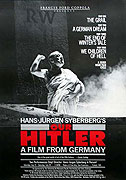
Regie:
Hans-Jürgen SyberbergKamera:
Dietrich LohmannBesetzung:
Harry Baer, Hellmut Lange, André Heller, Peter Kern, Heinz Schubert, Johannes Buzalski, Peter Lühr, Peter Moland, Alfred Edel, Rainer von Artenfels (mehr)Inhalte(1)
In a series of 22 tableaux set on a soundstage, Syberberg makes use of puppets, props, a thundering Wagnerian soundtrack, and rear-screen projection to evoke Nazi Germany, the origins of the Third Reich, and the disturbing aftermath that followed. Neither a feature film nor a conventional documentary, OUR HITLER is a seven-and-a-half-hour fever dream on coming to terms with Nazism. Originally distributed by Francis Coppola s Zoetrope Studios, this controversial film was hailed by Coppola as a work that made all other films of the time trivial or obsolete. (Verleiher-Text)
(mehr)Kritiken (1)
A grandiose experimental opera about facts, and an artistic chronicle of dreams and nightmares of one nation and one Europe; a film studio as Theatrum historiae, where the imagination of the German nation and the director's ideas of how to understand the past come to life behind the scenes. The film is controversial mainly because it shows the blame of everyone in the creation of the character of Adolf Hitler, a character more resembling a tragic megalomaniac opera rather than real history - the character rising from the grave of Richard Wagner, written into the script by the entire European civilization. From the irrationalism of romanticism, from the phantasms of nationalism, from the deaths of emperors and god, from the bourgeoisie's desire for certainty and glory and the workers' desire for a voice through a prophet of better tomorrows, from the dominance of the economy giving birth to soulless masses, who could not resist the allure of what is sacred, race, greatness, and togetherness. As Syberberg shows, even the post-war period gives birth to the fascination with that titan, who in the middle of Disneyland (which Europe turned into after the death of all traditional transcendent values, whose death Hitler accelerated so much) is seen as a great source of income for the new masses (the overall work strongly reminded me of Arendt and her book "The Origins of Totalitarianism"). We can agree or not, but the work is nevertheless very thought-provoking. /// Syberberg uses a variety of techniques and genres, from philosophical reflection to factographic reconstruction of historical events and particularly Hitler's personality, from intellectual abstraction to poetic insight, and from nostalgic ballads to ironic satire. The set and background materialize feelings and thoughts, dreams and phantasms with rear projection, thus best objectifying the deceased era, which allowed itself to be imprinted with the phantasm of an unrecognized painter, reader of Karl May, and lover of Wagner.
()